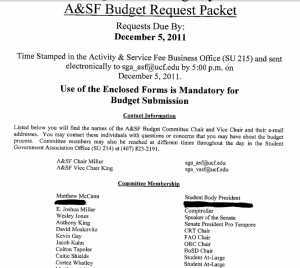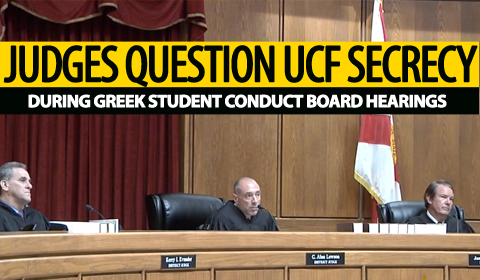The University of Central Florida faced some very tough questions from judges last Tuesday at the 5th District Court of Appeal in Daytona Beach regarding secrecy and university business.
“I don’t understand that at all,” said Chief Judge Alan Lawson, after hearing UCF’s position that its Student Conduct Board is merely a fact-finding body that can have secret organizational hearings.
UCF attorney Jeff Kuntz argued that the conduct board is simply making a recommendation that is not binding in any way, but the judges repeatedly questioned his position, pointing out that UCF is powerless to punish an organization without first securing a finding of in violation from the Conduct Board.
“So it’s almost like a binding or presumptive finding,” Judge Lawson asked. “And then, if they disagree with a no violation finding, they can’t act, they have to send it back. They can send it back a lot of times, but they can’t just do what they want, correct?”
Whether a decision is made is important because Sunshine Law states meetings with decision making bodies must be open to the public.

Knight News is not challenging UCF’s closure of individual student conduct hearings, for matters like cheating. Knight News is only challenging UCF’s closure of organizational hearings, such as fraternity hazing scandals, that would be public if UCF pursued the charges through a criminal court of law instead of its own secret justice system.
The lawsuit’s main contentions also include challenging the redaction of certain information, as well as the altogether withholding of documents by UCF that Knight News states to be public information. The university, however, claims the redactions made to documents to be private under the federal privacy law known as FERPA.
FERPA, or the Family Educational Rights and Privacy Act, was enacted in 1974 in order to protect the privacy of student education records such as SAT scores, and grade point averages. UCF clearly states in its appellate brief, “The records at issue are ‘education records.'” Knight News argues that UCF is abusing FERPA by withholding information from records that do not qualify as “education records” under FERPA’s protection.
SECRET SPENDING, SGA BUSINESS
Information being withheld by UCF includes the names of the student-elected SGA members who are responsible for deciding how the university’s nearly $20 million dollar student fee budget is spent. Knight News states in its appellate reply brief that it should be noted that, “No appellate court has held that student government records are education records, and UCF has adduced no reason for this Court to be the first.”
If the court finds in favor of UCF, by stating that all SGA documents including student names indeed are education records falling under the protection of FERPA, it “would permit ridiculous results,” according to Knight News.
For example, Knight News goes on to state that if UCF’s interpretation of FERPA stands, it would allow “a member of the Board of Trustees to conceal a controversial vote from minutes kept by UCF by simply enrolling in a college class.”
If UCF wins, it would also have the power to conceal the names of officials facing impeachment. State law currently allows student officials to be removed from office via public referendum. However, if the court finds in favor of UCF’s argument that the names of these officials are, in fact, able to be redacted, “How could students vote to remove a malfeasant whose identity is a secret?” Knight News asks in its brief.
If a student government officer committed a crime, like stealing an SGA laptop, that officer would face three different systems of justice. The official would face the criminal justice system and those records would be public. The student would also face UCF’s individual Student Conduct Board where the records would not be discussed publicly. But because the official chose to become a public servant, the official would also face a third process — SGA’s public impeachment process — to determine if he or she would be kicked out of SGA.
When it comes to the separate SGA impeachment proceedings against individual SGA members, UCF allows SGA discipline to be decided in an open hearing, even though UCF argues the documents discussed in the public SGA meetings are private FERPA education records.
UCF THREATENS KNIGHT NEWS
Knight News has received several threats from UCF’s lawyers throughout the entirety of this process. UCF even went as far as to make a motion which, if granted, would require Knight News to pay a crippling amount of fees to UCF as punishment for fighting them in court.
Knight News replied to UCF’s motion, stating that it is “substantively meritless” and is “at minimum UCF’s seventh written threat of sanctions against Knight News.” Knight News decided to continue its fight on behalf of the students for transparent government, despite UCF’s repeated threats of sanctions.
Both parties await the decision of this lawsuit to be made by the appellate judges. The decision is expected to be made within the upcoming weeks. Stay tuned to Knight News for continued coverage on this matter.







